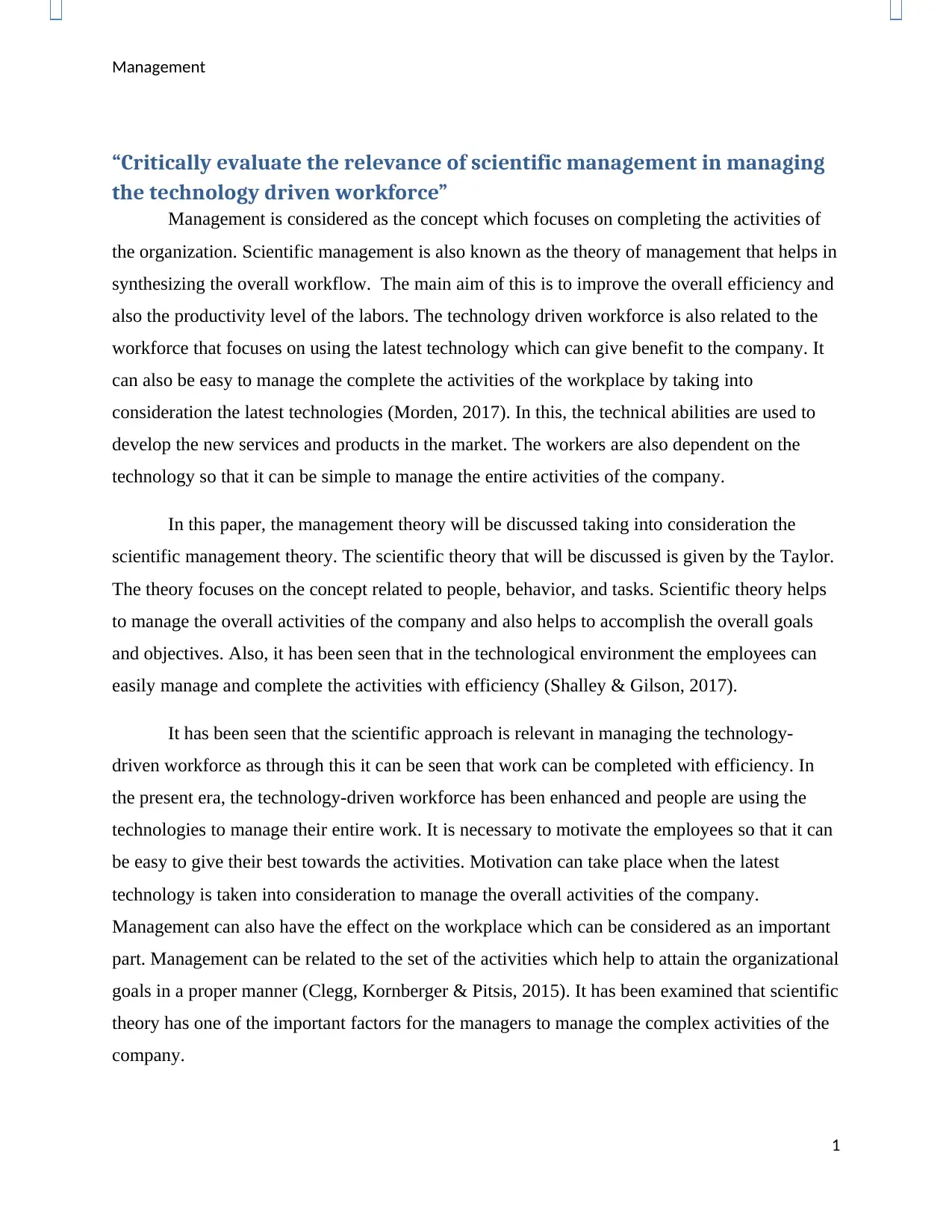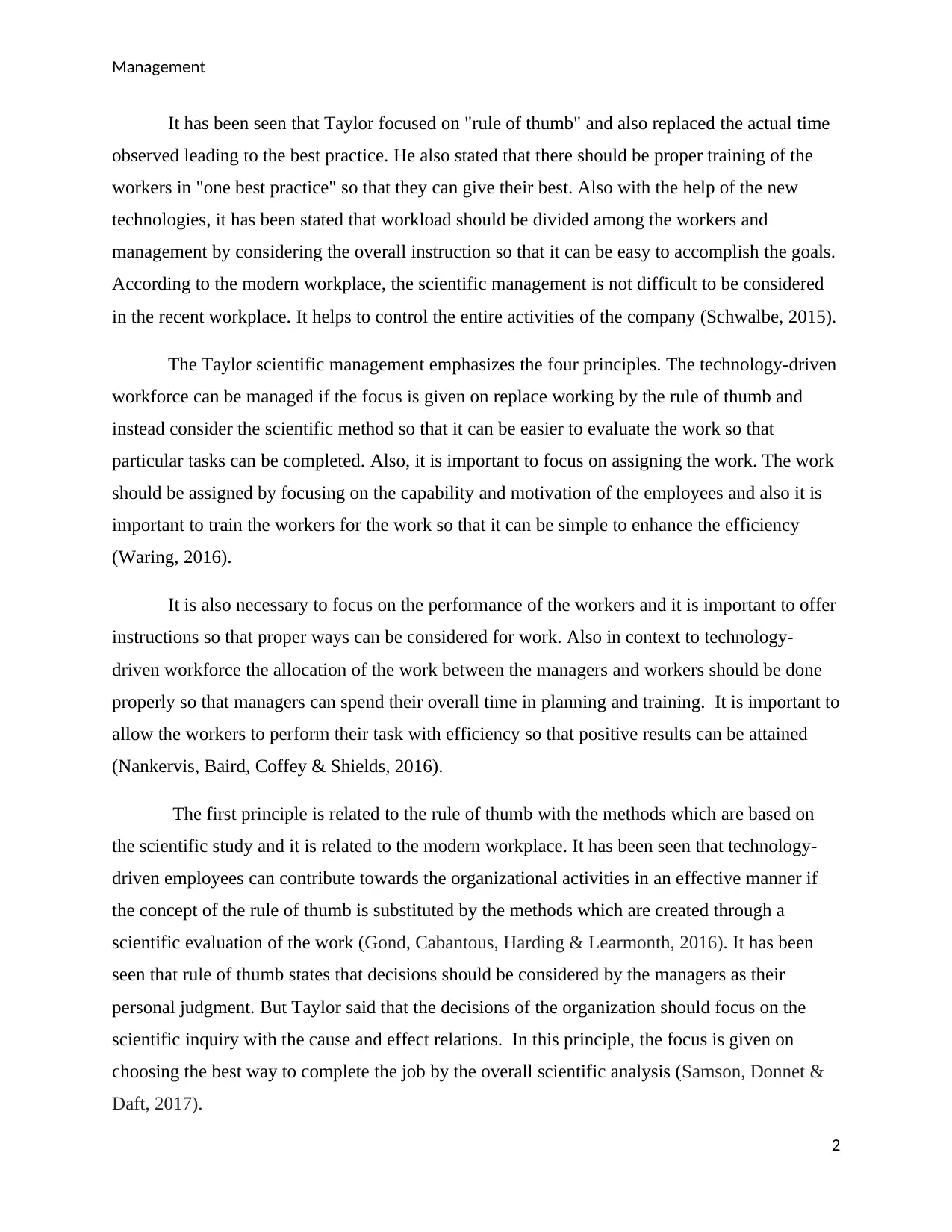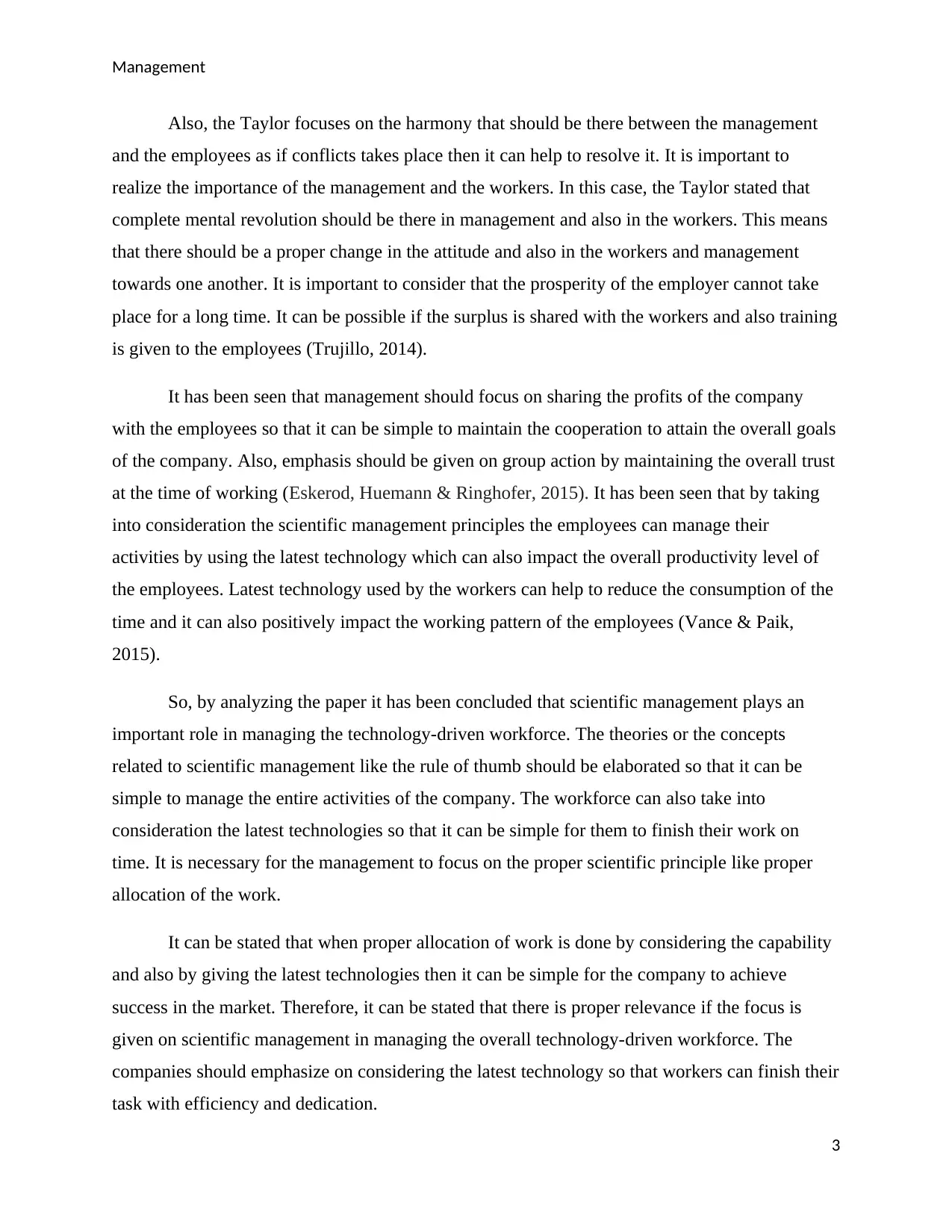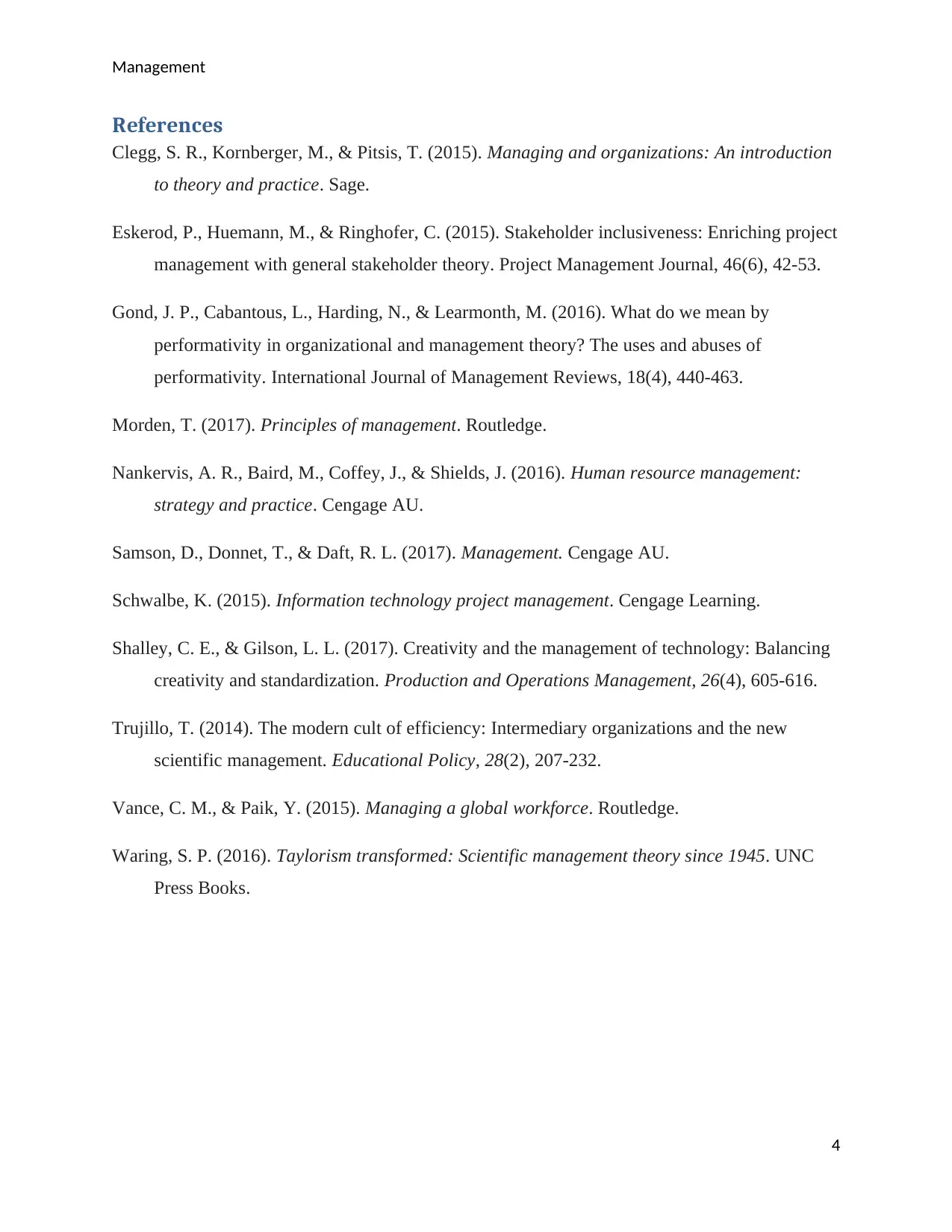BUMGT1501 Semester 2 Essay: Scientific Management and Workforce
VerifiedAdded on 2023/06/04
|5
|1698
|56
Essay
AI Summary
This essay critically evaluates the relevance of scientific management in managing a technology-driven workforce, focusing on principles derived from Taylor's theory. The essay begins by introducing management theory and the technological environment, setting the stage for an analysis of how scientific management principles, such as the replacement of 'rule of thumb' with scientific methods and the importance of worker training and motivation, apply in today's workplace. The essay emphasizes the importance of aligning management practices with the capabilities of the workforce and the utilization of technology to enhance efficiency and productivity. It explores the relevance of these principles, particularly the division of labor and the importance of harmony between management and employees, for the modern technology-driven workforce. The conclusion reinforces the importance of scientific management in optimizing the technology-driven workforce by highlighting the need for companies to implement these principles to achieve success.

Management
Paraphrase This Document
Need a fresh take? Get an instant paraphrase of this document with our AI Paraphraser

Management
“Critically evaluate the relevance of scientific management in managing
the technology driven workforce”
Management is considered as the concept which focuses on completing the activities of
the organization. Scientific management is also known as the theory of management that helps in
synthesizing the overall workflow. The main aim of this is to improve the overall efficiency and
also the productivity level of the labors. The technology driven workforce is also related to the
workforce that focuses on using the latest technology which can give benefit to the company. It
can also be easy to manage the complete the activities of the workplace by taking into
consideration the latest technologies (Morden, 2017). In this, the technical abilities are used to
develop the new services and products in the market. The workers are also dependent on the
technology so that it can be simple to manage the entire activities of the company.
In this paper, the management theory will be discussed taking into consideration the
scientific management theory. The scientific theory that will be discussed is given by the Taylor.
The theory focuses on the concept related to people, behavior, and tasks. Scientific theory helps
to manage the overall activities of the company and also helps to accomplish the overall goals
and objectives. Also, it has been seen that in the technological environment the employees can
easily manage and complete the activities with efficiency (Shalley & Gilson, 2017).
It has been seen that the scientific approach is relevant in managing the technology-
driven workforce as through this it can be seen that work can be completed with efficiency. In
the present era, the technology-driven workforce has been enhanced and people are using the
technologies to manage their entire work. It is necessary to motivate the employees so that it can
be easy to give their best towards the activities. Motivation can take place when the latest
technology is taken into consideration to manage the overall activities of the company.
Management can also have the effect on the workplace which can be considered as an important
part. Management can be related to the set of the activities which help to attain the organizational
goals in a proper manner (Clegg, Kornberger & Pitsis, 2015). It has been examined that scientific
theory has one of the important factors for the managers to manage the complex activities of the
company.
1
“Critically evaluate the relevance of scientific management in managing
the technology driven workforce”
Management is considered as the concept which focuses on completing the activities of
the organization. Scientific management is also known as the theory of management that helps in
synthesizing the overall workflow. The main aim of this is to improve the overall efficiency and
also the productivity level of the labors. The technology driven workforce is also related to the
workforce that focuses on using the latest technology which can give benefit to the company. It
can also be easy to manage the complete the activities of the workplace by taking into
consideration the latest technologies (Morden, 2017). In this, the technical abilities are used to
develop the new services and products in the market. The workers are also dependent on the
technology so that it can be simple to manage the entire activities of the company.
In this paper, the management theory will be discussed taking into consideration the
scientific management theory. The scientific theory that will be discussed is given by the Taylor.
The theory focuses on the concept related to people, behavior, and tasks. Scientific theory helps
to manage the overall activities of the company and also helps to accomplish the overall goals
and objectives. Also, it has been seen that in the technological environment the employees can
easily manage and complete the activities with efficiency (Shalley & Gilson, 2017).
It has been seen that the scientific approach is relevant in managing the technology-
driven workforce as through this it can be seen that work can be completed with efficiency. In
the present era, the technology-driven workforce has been enhanced and people are using the
technologies to manage their entire work. It is necessary to motivate the employees so that it can
be easy to give their best towards the activities. Motivation can take place when the latest
technology is taken into consideration to manage the overall activities of the company.
Management can also have the effect on the workplace which can be considered as an important
part. Management can be related to the set of the activities which help to attain the organizational
goals in a proper manner (Clegg, Kornberger & Pitsis, 2015). It has been examined that scientific
theory has one of the important factors for the managers to manage the complex activities of the
company.
1

Management
It has been seen that Taylor focused on "rule of thumb" and also replaced the actual time
observed leading to the best practice. He also stated that there should be proper training of the
workers in "one best practice" so that they can give their best. Also with the help of the new
technologies, it has been stated that workload should be divided among the workers and
management by considering the overall instruction so that it can be easy to accomplish the goals.
According to the modern workplace, the scientific management is not difficult to be considered
in the recent workplace. It helps to control the entire activities of the company (Schwalbe, 2015).
The Taylor scientific management emphasizes the four principles. The technology-driven
workforce can be managed if the focus is given on replace working by the rule of thumb and
instead consider the scientific method so that it can be easier to evaluate the work so that
particular tasks can be completed. Also, it is important to focus on assigning the work. The work
should be assigned by focusing on the capability and motivation of the employees and also it is
important to train the workers for the work so that it can be simple to enhance the efficiency
(Waring, 2016).
It is also necessary to focus on the performance of the workers and it is important to offer
instructions so that proper ways can be considered for work. Also in context to technology-
driven workforce the allocation of the work between the managers and workers should be done
properly so that managers can spend their overall time in planning and training. It is important to
allow the workers to perform their task with efficiency so that positive results can be attained
(Nankervis, Baird, Coffey & Shields, 2016).
The first principle is related to the rule of thumb with the methods which are based on
the scientific study and it is related to the modern workplace. It has been seen that technology-
driven employees can contribute towards the organizational activities in an effective manner if
the concept of the rule of thumb is substituted by the methods which are created through a
scientific evaluation of the work (Gond, Cabantous, Harding & Learmonth, 2016). It has been
seen that rule of thumb states that decisions should be considered by the managers as their
personal judgment. But Taylor said that the decisions of the organization should focus on the
scientific inquiry with the cause and effect relations. In this principle, the focus is given on
choosing the best way to complete the job by the overall scientific analysis (Samson, Donnet &
Daft, 2017).
2
It has been seen that Taylor focused on "rule of thumb" and also replaced the actual time
observed leading to the best practice. He also stated that there should be proper training of the
workers in "one best practice" so that they can give their best. Also with the help of the new
technologies, it has been stated that workload should be divided among the workers and
management by considering the overall instruction so that it can be easy to accomplish the goals.
According to the modern workplace, the scientific management is not difficult to be considered
in the recent workplace. It helps to control the entire activities of the company (Schwalbe, 2015).
The Taylor scientific management emphasizes the four principles. The technology-driven
workforce can be managed if the focus is given on replace working by the rule of thumb and
instead consider the scientific method so that it can be easier to evaluate the work so that
particular tasks can be completed. Also, it is important to focus on assigning the work. The work
should be assigned by focusing on the capability and motivation of the employees and also it is
important to train the workers for the work so that it can be simple to enhance the efficiency
(Waring, 2016).
It is also necessary to focus on the performance of the workers and it is important to offer
instructions so that proper ways can be considered for work. Also in context to technology-
driven workforce the allocation of the work between the managers and workers should be done
properly so that managers can spend their overall time in planning and training. It is important to
allow the workers to perform their task with efficiency so that positive results can be attained
(Nankervis, Baird, Coffey & Shields, 2016).
The first principle is related to the rule of thumb with the methods which are based on
the scientific study and it is related to the modern workplace. It has been seen that technology-
driven employees can contribute towards the organizational activities in an effective manner if
the concept of the rule of thumb is substituted by the methods which are created through a
scientific evaluation of the work (Gond, Cabantous, Harding & Learmonth, 2016). It has been
seen that rule of thumb states that decisions should be considered by the managers as their
personal judgment. But Taylor said that the decisions of the organization should focus on the
scientific inquiry with the cause and effect relations. In this principle, the focus is given on
choosing the best way to complete the job by the overall scientific analysis (Samson, Donnet &
Daft, 2017).
2
⊘ This is a preview!⊘
Do you want full access?
Subscribe today to unlock all pages.

Trusted by 1+ million students worldwide

Management
Also, the Taylor focuses on the harmony that should be there between the management
and the employees as if conflicts takes place then it can help to resolve it. It is important to
realize the importance of the management and the workers. In this case, the Taylor stated that
complete mental revolution should be there in management and also in the workers. This means
that there should be a proper change in the attitude and also in the workers and management
towards one another. It is important to consider that the prosperity of the employer cannot take
place for a long time. It can be possible if the surplus is shared with the workers and also training
is given to the employees (Trujillo, 2014).
It has been seen that management should focus on sharing the profits of the company
with the employees so that it can be simple to maintain the cooperation to attain the overall goals
of the company. Also, emphasis should be given on group action by maintaining the overall trust
at the time of working (Eskerod, Huemann & Ringhofer, 2015). It has been seen that by taking
into consideration the scientific management principles the employees can manage their
activities by using the latest technology which can also impact the overall productivity level of
the employees. Latest technology used by the workers can help to reduce the consumption of the
time and it can also positively impact the working pattern of the employees (Vance & Paik,
2015).
So, by analyzing the paper it has been concluded that scientific management plays an
important role in managing the technology-driven workforce. The theories or the concepts
related to scientific management like the rule of thumb should be elaborated so that it can be
simple to manage the entire activities of the company. The workforce can also take into
consideration the latest technologies so that it can be simple for them to finish their work on
time. It is necessary for the management to focus on the proper scientific principle like proper
allocation of the work.
It can be stated that when proper allocation of work is done by considering the capability
and also by giving the latest technologies then it can be simple for the company to achieve
success in the market. Therefore, it can be stated that there is proper relevance if the focus is
given on scientific management in managing the overall technology-driven workforce. The
companies should emphasize on considering the latest technology so that workers can finish their
task with efficiency and dedication.
3
Also, the Taylor focuses on the harmony that should be there between the management
and the employees as if conflicts takes place then it can help to resolve it. It is important to
realize the importance of the management and the workers. In this case, the Taylor stated that
complete mental revolution should be there in management and also in the workers. This means
that there should be a proper change in the attitude and also in the workers and management
towards one another. It is important to consider that the prosperity of the employer cannot take
place for a long time. It can be possible if the surplus is shared with the workers and also training
is given to the employees (Trujillo, 2014).
It has been seen that management should focus on sharing the profits of the company
with the employees so that it can be simple to maintain the cooperation to attain the overall goals
of the company. Also, emphasis should be given on group action by maintaining the overall trust
at the time of working (Eskerod, Huemann & Ringhofer, 2015). It has been seen that by taking
into consideration the scientific management principles the employees can manage their
activities by using the latest technology which can also impact the overall productivity level of
the employees. Latest technology used by the workers can help to reduce the consumption of the
time and it can also positively impact the working pattern of the employees (Vance & Paik,
2015).
So, by analyzing the paper it has been concluded that scientific management plays an
important role in managing the technology-driven workforce. The theories or the concepts
related to scientific management like the rule of thumb should be elaborated so that it can be
simple to manage the entire activities of the company. The workforce can also take into
consideration the latest technologies so that it can be simple for them to finish their work on
time. It is necessary for the management to focus on the proper scientific principle like proper
allocation of the work.
It can be stated that when proper allocation of work is done by considering the capability
and also by giving the latest technologies then it can be simple for the company to achieve
success in the market. Therefore, it can be stated that there is proper relevance if the focus is
given on scientific management in managing the overall technology-driven workforce. The
companies should emphasize on considering the latest technology so that workers can finish their
task with efficiency and dedication.
3
Paraphrase This Document
Need a fresh take? Get an instant paraphrase of this document with our AI Paraphraser

Management
References
Clegg, S. R., Kornberger, M., & Pitsis, T. (2015). Managing and organizations: An introduction
to theory and practice. Sage.
Eskerod, P., Huemann, M., & Ringhofer, C. (2015). Stakeholder inclusiveness: Enriching project
management with general stakeholder theory. Project Management Journal, 46(6), 42-53.
Gond, J. P., Cabantous, L., Harding, N., & Learmonth, M. (2016). What do we mean by
performativity in organizational and management theory? The uses and abuses of
performativity. International Journal of Management Reviews, 18(4), 440-463.
Morden, T. (2017). Principles of management. Routledge.
Nankervis, A. R., Baird, M., Coffey, J., & Shields, J. (2016). Human resource management:
strategy and practice. Cengage AU.
Samson, D., Donnet, T., & Daft, R. L. (2017). Management. Cengage AU.
Schwalbe, K. (2015). Information technology project management. Cengage Learning.
Shalley, C. E., & Gilson, L. L. (2017). Creativity and the management of technology: Balancing
creativity and standardization. Production and Operations Management, 26(4), 605-616.
Trujillo, T. (2014). The modern cult of efficiency: Intermediary organizations and the new
scientific management. Educational Policy, 28(2), 207-232.
Vance, C. M., & Paik, Y. (2015). Managing a global workforce. Routledge.
Waring, S. P. (2016). Taylorism transformed: Scientific management theory since 1945. UNC
Press Books.
4
References
Clegg, S. R., Kornberger, M., & Pitsis, T. (2015). Managing and organizations: An introduction
to theory and practice. Sage.
Eskerod, P., Huemann, M., & Ringhofer, C. (2015). Stakeholder inclusiveness: Enriching project
management with general stakeholder theory. Project Management Journal, 46(6), 42-53.
Gond, J. P., Cabantous, L., Harding, N., & Learmonth, M. (2016). What do we mean by
performativity in organizational and management theory? The uses and abuses of
performativity. International Journal of Management Reviews, 18(4), 440-463.
Morden, T. (2017). Principles of management. Routledge.
Nankervis, A. R., Baird, M., Coffey, J., & Shields, J. (2016). Human resource management:
strategy and practice. Cengage AU.
Samson, D., Donnet, T., & Daft, R. L. (2017). Management. Cengage AU.
Schwalbe, K. (2015). Information technology project management. Cengage Learning.
Shalley, C. E., & Gilson, L. L. (2017). Creativity and the management of technology: Balancing
creativity and standardization. Production and Operations Management, 26(4), 605-616.
Trujillo, T. (2014). The modern cult of efficiency: Intermediary organizations and the new
scientific management. Educational Policy, 28(2), 207-232.
Vance, C. M., & Paik, Y. (2015). Managing a global workforce. Routledge.
Waring, S. P. (2016). Taylorism transformed: Scientific management theory since 1945. UNC
Press Books.
4
1 out of 5
Related Documents
Your All-in-One AI-Powered Toolkit for Academic Success.
+13062052269
info@desklib.com
Available 24*7 on WhatsApp / Email
![[object Object]](/_next/static/media/star-bottom.7253800d.svg)
Unlock your academic potential
Copyright © 2020–2025 A2Z Services. All Rights Reserved. Developed and managed by ZUCOL.





